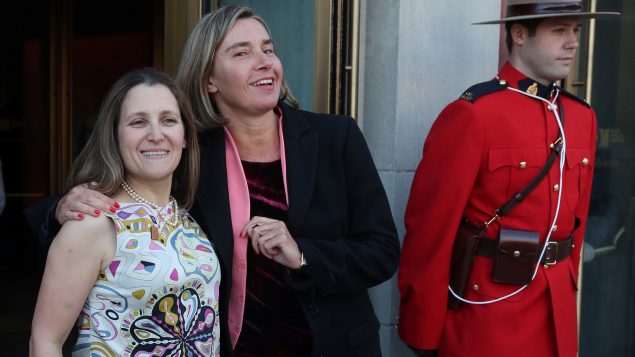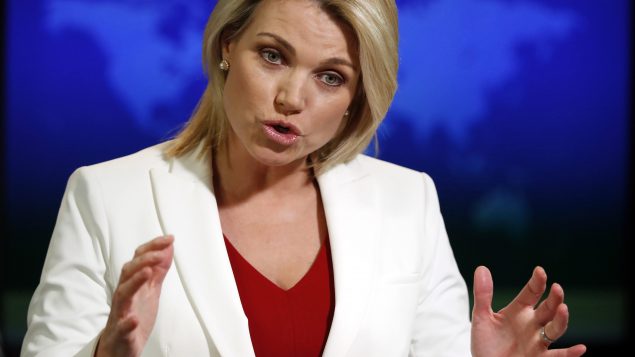A prominent German human rights group is calling on Berlin and European Union officials in Brussels to act as mediators in the diplomatic dispute between Canada and Saudi Arabia over Ottawa’s public criticism of Riyadh’s human rights policies.
Saudi Arabia expelled Canada’s ambassador in Riyadh on Sunday over what officials called “blatant interference in the Kingdom’s domestic affairs,” after Foreign Affairs Minister Chrystia Freeland tweeted Thursday that Canada was “very alarmed” by the arrest of two additional women activists and urged Saudi authorities to release them.
Saudi Arabia also recalled its ambassador in Ottawa and halted all new investment and trade transactions with Canada, ordered nearly 15,000 Saudi students in Canada to transfer to other countries, and suspended flights to Canada.

Saudi Arabia’s Foreign Minister Adel Al-Jubeir speaks during a news conference in Riyadh, Saudi Arabia August 8, 2018. (Faisal Al Nasser/REUTERS)
On Wednesday, Riyadh also ordered all Saudi patients undergoing treatment in Canada to be transferred to other countries, as well as halted purchases of Canadian barley and wheat.
But while Saudi Arabia has been getting messages of support from regional allies and even rivals like Russia, Canada’s Western allies – even those who had experienced similar Saudi outbursts in the past, such as Germany and Sweden – have decided to keep out of the latest dispute, at least publicly.
The International Society for Human Rights (IGFM) based in Frankfurt said that Germany and the EU must not remain passive in the dispute, German Press Agency dpa reported Friday.
“We are witnessing a democratic constitutional state such as Canada being shown up and disciplined by Saudi Arabia, a state that tortures [citizens and] shows contempt for human rights,” spokesman Martin Lessenthin said.
Allies stay mum

Canada’s Minister of Foreign Affairs Chrystia Freeland is joined by High Representative for the European Union’s Foreign Affairs Federica Mogherini prior to a reception at the Royal Ontario Museum on the first day of meetings for foreign ministers from G7 countries in Toronto, Ontario, Canada April 22, 2018. (Fred Thornhill /REUTERS)
Despite sharing Canada’s concerns over the treatment of Saudi women activists and the state of human right in the kingdom, European Union seems to be staying away from the political minefield the Ottawa-Riyadh row presents.
On Tuesday reporters in Brussels grilled Maja Kocinjancic, a spokesperson for the European External Action Service (EEAS), the EU’s diplomatic service, on the union’s position on the escalating crisis.
The EU has been seeking clarifications from Saudi authorities on the circumstances around the arrests of women human rights defenders in Saudi Arabia since the first arrests in May, Kocinjancic told reporters.
“When it comes specifically to the relations between Canada and the Kingdom of Saudi Arabia, we have been following the developments in diplomatic relations between the two,” she said. “In line with diplomatic practice, we do not comment on bilateral relations.”
The U.K.’s Foreign and Commonwealth Office said that both Canada and Saudi Arabia “are close partners.”
“We urge restraint during the current situation,” the statement said.

State Department spokeswoman Heather Nauert speaks during a briefing at the State Department in Washington, Wednesday, Aug. 9, 2017. (Alex Brandon/AP Photo)
Even the United States, Canada’s closest ally and partner, issued a very neutral statement, saying “Canada and Saudi Arabia are both close allies of the United States.”
Heather Nauert, a U.S. State Department spokeswoman, said Tuesday the U.S. is urging Canada and Saudi Arabia to use diplomacy to resolve their dispute.
“Both sides need to diplomatically resolve this together. We can’t do it for them, they need to resolve it together,” Nauert said in a briefing.
Speaking to reporters in Montreal on Wednesday Trudeau sought to downplay the lack of support his government has received from Western allies.
“I’m never going to impose on another country what their reactions should be or what their response should be,” Trudeau said. “I respect the rights of individual countries to make their decisions and speak for themselves.”







For reasons beyond our control, and for an undetermined period of time, our comment section is now closed. However, our social networks remain open to your contributions.